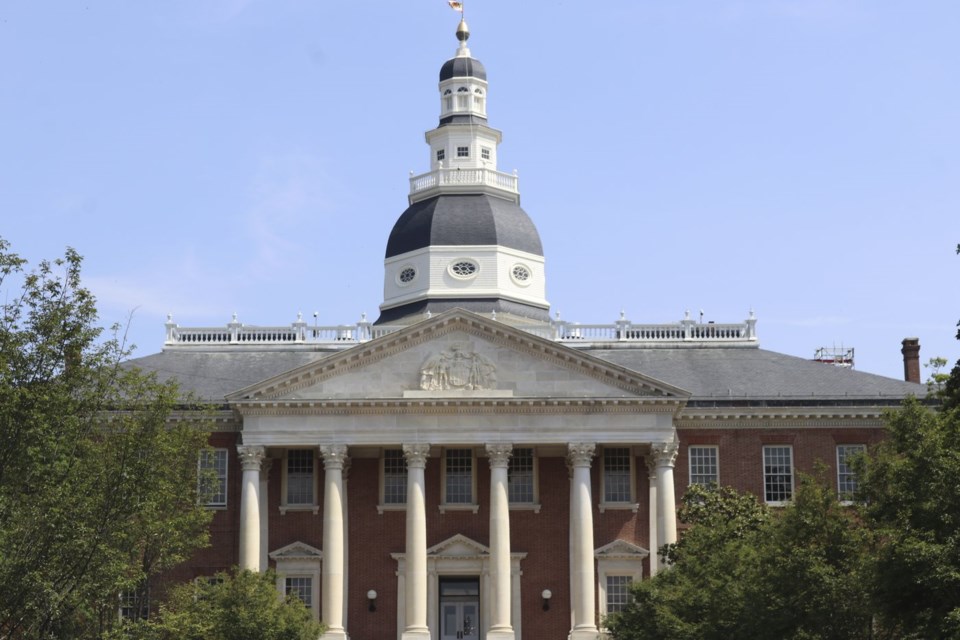ANNAPOLIS, Md. (AP) — Maryland will become the first state to use money collected from a surcharge on insurance plans sold under the Affordable Care Act to fund a program to pay for abortions, regardless of a patient's insurance coverage, under a measure signed into law Tuesday by Democratic Gov. Wes Moore.
The law will make about $25 million available when it takes effect July 1, because a $1 surcharge has been unused and growing over the last 15 years since the ACA took effect in 2010. It's estimated to make about $3 million available annually in future years.
“The lieutenant governor and I were very clear from Day 1 — that Maryland will always be a safe haven for abortion access,” Moore said, highlighting the measure among some 170 bills signed at a ceremony.
The program will be paid for through the transfer of certain insurance premium funds collected by carriers that can only be used for abortion coverage in accordance with the ACA. Supporters say other states have access to a similar surplus of funds through their state exchange insurance systems.
“If programs like ours are duplicated across the country, we could help millions of Americans access essential abortion care — without relying on taxpayer dollars,” said Del. Lesley Lopez, a Democrat from Maryland's Montgomery County, in the suburbs of the nation's capital.
Officials in New York and Illinois already have reached out to Maryland officials to learn more about the program, said Lopez, who sponsored the bill.
A dozen states require abortion coverage in ACA marketplace plans, according to KFF, a nonprofit that researches health care issues. They are California, Colorado, Illinois, Maine, Maryland, Massachusetts, Minnesota, New Jersey, New York, Oregon, Vermont and Washington.
“This money exists in every state that has abortion as a required type of care under their state’s benefit exchanges," Lopez said. "It’s basically all the blue states that mandated abortion be covered when the Affordable Care Act was starting to be implemented.”
The law creates a grant program fund in the state's health department to improve access to abortion clinical services. It requires the department to award grants to nonprofit organizations to support equitable access.
Lynn McCann-Yeh, co-executive director of the Baltimore Abortion Fund, which helps pay costs associated with abortion for people who live in Maryland or who travel there, said it’s hard to keep up with an annual budget of about $2 million.
“We would need many, many more times over that to fully be able to meet the full logistic and medical support for each caller,” she said.
She said the $3 million that would be made available annually under the new law could make a major difference. The fund could apply to administer a share of that money.
“The $3 million is a great start, but it will take more than that and it will take sustained funding,” she said.
Maryland's legislature is controlled by Democrats, who hold a 2-1 advantage over Republicans in voter registration statewide. Last year, Maryland voters approved a constitutional amendment with 76% support to enshrine abortion rights in the state's constitution, in response to the 2022 decision by the U.S. Supreme Court to overturn Roe v. Wade. The court's decision in the Dobbs v. Jackson Women’s Health Organization gave control over abortion to the states.
“I think before the Dobbs decision, there just wasn’t quite the same type of urgency as there is now," Lopez said. "We’ve seen abortion bans in some form or another in double digits in states across the country, so we’ve got to make sure that we shore up all the support we can in a state like Maryland that has it as a constitutionally protected right.”
Twelve states currently enforce abortion bans with limited exceptions at all stages of pregnancy. Four more have bans that kick in after about six weeks, which is before many women know they’re pregnant.
The Dobb decision and an influx of people from other states seeking abortions in Maryland has made the financial need more urgent, supporters of the law say.
Maryland has been seeing an increase in patients from other states where abortion has been banned. Last year, 15% of abortions in Maryland were obtained by patients from other states, according to the Guttmacher Institute, a research organization that supports abortion rights. That's a decrease from 20% in 2023.
___
Associated Press journalist Geoff Mulvihill contributed to this report from Cherry Hill, New Jersey.
Brian Witte, The Associated Press



